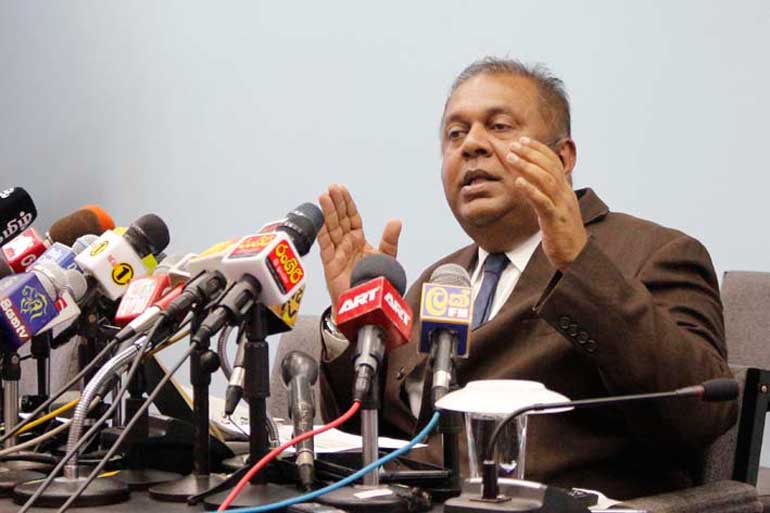Sunday Mar 01, 2026
Sunday Mar 01, 2026
Thursday, 25 June 2015 00:59 - - {{hitsCtrl.values.hits}}
Insists it is broadening exchange to neutralise terrorism and foster reconciliation

FM Mangala Samaraweera's Press Conference at Govt. Information Department
By Uditha Jayasinghe
Brushing up national security credentials yesterday, Foreign Minister Mangala Samaraweera told parliament that the Government was working on multiple fronts to neutralise the LTTE and its international existence is proof of the former administration’s efforts to do the same.
Responding to Opposition leader Nimal Siripala de Silva’s queries on the recently released US State Department Report titled ‘Country Reports on Terrorism and Patterns of Global Terrorism’ that indicated the LTTE presence internationally was still strong, Samaraweera insisted that it did not reflect on the Government as it was based on events accumulated in 2013 and 2014.
“That LTTE groups may still have the motivation to sustain their financial and support networks five years after the end of the war is a clear indicator of the failure of the Rajapaksa administration’s post-war counter-terrorism policies,” he told parliament.
The Government, in contrast, is using the full gamut of its foreign relations to both engage with other state actors in anti-terrorism as well as directly communicate with groups who favour a united Sri Lanka, he added.
“We are using soft power and diplomacy, while ensuring our borders remain strong and our maritime security remains firm, to win the hearts and minds of all those who may oppose the state – whatever ethnic, religious, class or cultural group they may represent.
“It is the Government’s intention to remove the base of support of violent radical groups, by diminishing their popularity and legitimacy among the populations who might otherwise sustain them with material and moral support.”
Samaraweera went onto say that entrenched misconceptions and fear of the diaspora communities had to be dispelled so that relations could be developed linked to reconciliation. He also pointed out that any sustainable peace would necessitate such exchange.
“We must not confuse those who raise funds through illegal activities to promote their violent agendas with those who voice concern about the displaced or the detained. This distinction is important if our country is to turn its back on its violent past for good,” he said.
“Engagement and dialogue are essential to ensure that those who hold dissenting views are heard and that those who suffer grievances may resolve them without having to resort to violence.”
He also insisted the present opportunity to address the root causes of violence, to use global law enforcement cooperation, to improve domestic criminal justice systems and to increase outreach to affected communities must be utilised. “These will be the tools with which we permanently steal away the hearts and minds, the very oxygen, from terrorist organisations,” he noted.